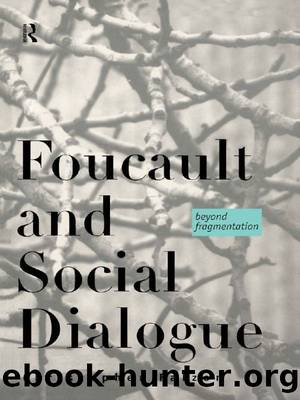Foucault and Social Dialogue: Beyond Fragmentation by Falzon Chris

Author:Falzon, Chris [Falzon, Chris]
Language: eng
Format: epub
Publisher: Taylor & Francis
Published: 2006-06-18T16:00:00+00:00
3
ETHICS, CRITIQUE AND ENLIGHTENMENT
The reading of Foucault presented in the previous chapter has made it possible to give some substance to the notion of dialogue, which can be understood in terms of the agonistic combat or interplay of corporeal forces. We have seen how the primacy of this dialogical interplay in Foucault’s picture is manifest in so far as no ordering of the world is ever absolute and all-embracing, no state of closure or domination ever complete. All forms of social ordering which seek to suppress otherness and to arrest dialogue are inevitably subject to resistance, to human freedom and transgression, and ultimately to transformation in the ongoing dialogue of forces, the continuing movement of history.
In this chapter I will argue that there is another way in which this resistance to forms of ordering, through which dialogue is reopened, can manifest itself. As I have mentioned, historical dialogue also gives rise to forms of ordering in the first place. In other words, order is not simply something that is imposed from outside upon human beings who, as other, resist and transgress imposed limits. Human beings also seek to order, to organise the other, and are thus implicated in the emergence of the forms of order that suppress otherness and arrest dialogue. My suggestion is that, in so far as we are involved in maintaining closure and domination, resistance to these forms of closure and domination can also manifest itself in an indirect form. That is, it can manifest itself through our adoption of different attitudes towards the other, attitudes of openness towards the other which are opposed to domination, and which are instrumental in promoting ongoing resistance, creative transgression, dialogue and transformation. And I want to argue that this openness towards the other, which serves as an indirect means or instrument of resistance, is what the ethical comes to in a dialogical context. Exploring this idea will bring us once again to the work of Foucault. Having interpreted him as presenting a certain conception of dialogue, I will argue that the kind of dialogically-based ethical position I am proposing is also present in Foucault.
Ethics
First of all, let us consider what might be involved in the notion of the ethical. An ethics involves, at the very least, a reference to normative principles, in terms of which we act and make judgements. Moreover, I would suggest, it involves some account of how these normative principles can be engendered, some account of the ‘principle of principles’. Now, we are accustomed to understanding ethics along Kantian lines, in terms of normative principles for behaviour which are universal, abstract, formal and capable of being grasped by the rational mind. The principle of principles for this ethics is the Categorical Imperative, which in Kant’s first formulation is the principle that moral principles are those which can be universalised. Through this process we exclude everything that is particular, specific and bodily from the picture, and establish moral principles on purely rational grounds. Ethics so understood presupposes that
Download
This site does not store any files on its server. We only index and link to content provided by other sites. Please contact the content providers to delete copyright contents if any and email us, we'll remove relevant links or contents immediately.
| Anthropology | Archaeology |
| Philosophy | Politics & Government |
| Social Sciences | Sociology |
| Women's Studies |
The remains of the day by Kazuo Ishiguro(8965)
Tools of Titans by Timothy Ferriss(8360)
Giovanni's Room by James Baldwin(7315)
The Black Swan by Nassim Nicholas Taleb(7097)
Inner Engineering: A Yogi's Guide to Joy by Sadhguru(6783)
The Way of Zen by Alan W. Watts(6590)
Asking the Right Questions: A Guide to Critical Thinking by M. Neil Browne & Stuart M. Keeley(5751)
The Power of Now: A Guide to Spiritual Enlightenment by Eckhart Tolle(5742)
The Six Wives Of Henry VIII (WOMEN IN HISTORY) by Fraser Antonia(5493)
Astrophysics for People in a Hurry by Neil DeGrasse Tyson(5172)
Housekeeping by Marilynne Robinson(4433)
12 Rules for Life by Jordan B. Peterson(4298)
Double Down (Diary of a Wimpy Kid Book 11) by Jeff Kinney(4257)
The Ethical Slut by Janet W. Hardy(4236)
Skin in the Game by Nassim Nicholas Taleb(4232)
Ikigai by Héctor García & Francesc Miralles(4229)
The Art of Happiness by The Dalai Lama(4120)
Skin in the Game: Hidden Asymmetries in Daily Life by Nassim Nicholas Taleb(3986)
Walking by Henry David Thoreau(3949)
